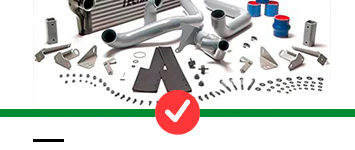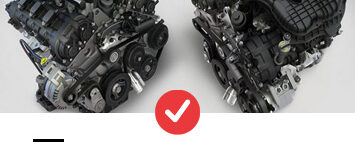Ford 6.0 Powerstroke Exhaust Systems
An exhaust system is made up of pipes used to draw harmful gases from the engine and release them further away. A car’s engine produces Carbon Dioxide, which can be lethal when present in high amounts, as well as Carbon Monoxide and Nitrogen Oxide.
The exhaust system, primarily the muffler, clears out all of the bad fumes that have been created by your car before they reach you in the cabin. That being said, it is important to have a quality and functioning exhaust system for any vehicle. We’ve compiled a list of some of the best exhausts for a 6.0 Powerstroke truck.
Click here to skip to our recommended pick!
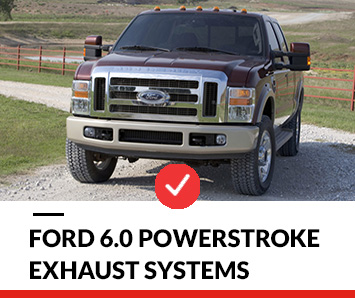
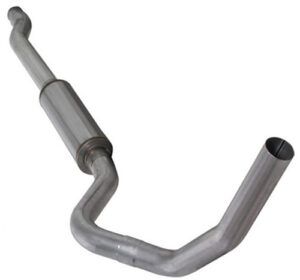
- Fits: 2003.5-2007 Ford F-250/350 6.0 Powerstroke
- Material: Aluminized Steel
- Warranty: 1-Year
- Value for money: 🔥🔥🔥🔥🔥
- Purchase link: Buy your Diamond Eye Performance Aluminized Cat Back Single Exhaust for 6.0 Powerstroke at Amazon!
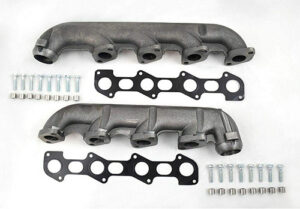
- Fits: 2003.5-2007 Ford F-250/350 6.0 Powerstroke
- Upgraded Exhaust Manifold
- Type: Manifold
- Value for money: 🔥🔥🔥🔥
- Purchase link: Buy your Ported High Flow Exhaust Manifolds for 2003-2010 Ford Powerstroke Diesel 6.0L 6.4L at Amazon!
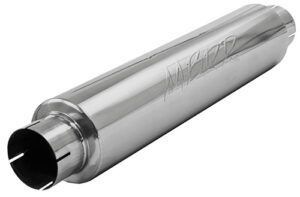
- Fits: 2003.5-2007 Ford F-250/350 6.0 Powerstroke
- Durable Construction
- Diameter: 4″
- Material: T-409 Stainless Steel
- Value for money: 🔥🔥🔥🔥
- Purchase link: Buy your MBRP M1004S Universal Quiet Tone Muffler at Amazon!
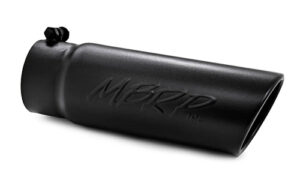
- Fits: 2003.5-2007 Ford F-250/350 6.0 Powerstroke
- Polished T-304 stainless steel
- Material: T-304 Stainless Steel
- Diameter: 4″
- No welding required
- Value for money: 🔥🔥🔥🔥
- Purchase link: Buy your MBRP T5112BLK 10" Black Finish Angled Rolled End Exhaust Tip at Amazon!
What is a 6.0 Exhaust?
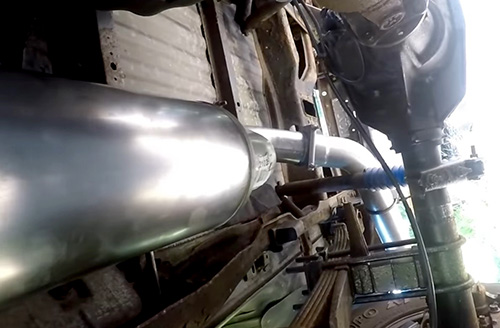
Your car’s exhaust system is designed to reduce the amount of air pollution that your engine creates, but with contamination and car parts wear. As your car engine runs, it produces more than just gas- the toxic gases that come from burning fossil fuels. The exhaust gases from this truck can be dangerous when in a large quantity. With the right exhaust system, 6.0 Powerstroke trucks do not emit any harmful gases inx`to the interior of your truck. This leads to an amazing driving experience with less wear on your vehicle.
Parts of the 6.0 Exhaust System
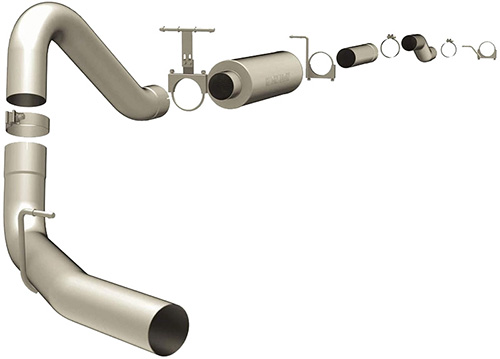
The exhaust system of your Ford 6.0 Powerstroke has many parts, all working together to remove gases from the truck. Follow these tips for maintaining your engine’s optimal performance.
Exhaust Manifolds/Headers
Exhaust enters the manifold attached at each cylinder head. The manifold leads all of the exhausts to a single exit point, where it leaves as a mixture of air and glasses. There are pipes on each side that collect and combine exhaust before exiting; this is called a collector. The stock manifold may be constructed from cast iron, but it won’t deliver the performance you want. If you want better results, replace your old manifold with a new one.
Catalytic Converters
The catalytic converter is an emissions control device for motor vehicle engines. The role of the catalytic converter is to turn harmful chemicals coming from the exhaust into less dangerous ones. Ford Powerstroke exhaust systems come with a Euro-tuned performance muffler that cuts down on carbon monoxide, hydrocarbons and nitrogen oxide. In addition to the catalytic converter being an issue when your Ford 6.0 powerstroke exhaust system is off, you will also have major repair bills coming your way if these symptoms are ignored. That’s why it’s important to take on regular maintenance for the vehicle, and avoid expensive repairs in the future.
Mufflers
If nothing was beyond the catalytic converter, your exhaust would be loud and obnoxious. You wouldn’t get that aggressive tone you’re used to hearing since a muffler is there to reduce noise. Mufflers usually contain various chambers, which vibrate and cancel out the noise from the engine. Performance mufflers have resonating chambers to create a deeper sound and more pleasing experience. They can also be configured with different dimensions for inlet and outlet speeds to appear as if you have dual exhaust pipes if you do not actually have them.
The exhaust system is a crucial part of any vehicle, and the sound a muffler creates distinguishes one type from another. Some are bulky and have sound-reducing chambers inside them, which can make a variety of sounds undetectable to listeners. You cannot open these exhaust systems up to clean them out. Aftermarket mufflers are much less bulky and lack the internal chambers that help keep noise down. Cleaning them can be done after they have been removed from the vehicle.
Exhaust Tips
The exhaust tips, the last part of your truck’s exhaust system, will influence performance even though they are located quite some distance from its beginnings. Wider exhaust pipe diameters reduce the backup of pressure that throttles down motor power.
Ford 6.0 powerstroke exhaust systems are offered with a variety of finish options to suit your desired look, and can also be finished off by the end user with various style bends or rolled edges for an even more personalized touch.
Benefits of Choosing the Best Exhaust for 6.0 Powerstroke
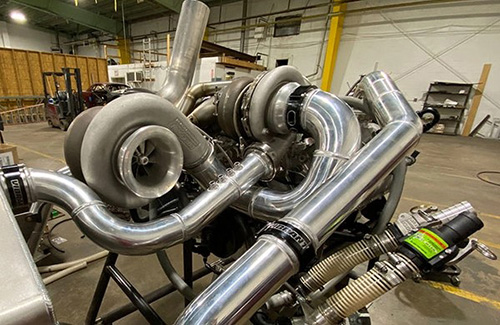
If you already have an exhaust on your truck, is it worth upgrading? Yes! There are several reasons why aftermarket 6.0 Powerstroke exhaust pipes improve performance and durability.
More Efficiency
Older Ford trucks need newer exhaust systems. Your truck naturally emits a lot of gases into the environment. This is not only bad for the environment, but it also impacts efficiency as the gas gets older and less productive. By upgrading your truck with a newer exhaust system, you’re taking better care of both your truck and your air quality.
Better Style
A Ford 6.0 powerstroke exhaust can upgrade the style of your vehicle, even if you choose something with a polished tip. Stand out and show off how much care you put into your truck!
Increased Performance
A larger pipe diameter creates less restriction in the engine, which helps it work more efficiently and boosts power. As the gas flows more freely, you should notice an increase in fuel economy as there’s not as much back pressure on your system.
Better Sound
When replacing your truck’s exhaust system, you can alter the sound of the engine by opting to have a new muffler installed. You can choose something that creates an aggressive tone or stick with the factory exhaust for reduced noise. A good engine sound not only diverts your attention to the power behind it, but also proves that you are getting sufficient horsepower levels.
Installing an aftermarket muffler on your Ford 6.0 powerstroke will highlight the engine sound, which is bad for noise isolation. If you’re not in a country with regulations about exhaust systems, try tuning the bike to get it sounding better.
How to Choose a 6.0 Powerstroke Exhaust: Buying Considerations

When upgrading your exhaust system, it pays to make sure that the new one will offer everything you need. A freshly manufactured 6.0 Ford Powerstroke engine brings much to store for those looking for a reliable power source in their trucks or diesel motorhome.
On the automotive aftermarket, there are many different options to choose from – which is good! But it can also make buying an exhaust system difficult when you have so many choices. Choosing the right Ford 6.0 Powerstroke exhaust system can be challenging. There are many factors involved including sound, airflow, and various components that you need to consider when making your decision.
Efficiency
When it comes to the environment, a well-performing exhaust system helps to reduce opportunities for cars to release toxic gas. With the installation of an updated aftermarket exhaust system, Europeans can ensure that their vehicles are more environmentally friendly and help prevent carbon emissions.
Pipe Diameter
The exhaust should have a large diameter piping system for optimum air capacity. The device should also be unencumbered by kinks in the pipes to make sure gases flow freely and there is no back pressure from the fumes, especially if you want improved power.
Material
Aftermarket exhausts can be manufactured from stainless steel or mild steel. The more cost effective option is mild steel, but stainless offers greater protection against corrosion.
Compatibility
When searching for 2003 Ford F250 exhaust systems, be sure to look through the 2004 F250 options. Not all of them may be compatible with your truck, but it’s worth looking at before settling on a Powerstroke exhaust system that won’t fit in your 6.0 engine.
Price
Finding a top quality 6.0 Powerstroke exhaust for your Ford can seem like a lot of work because there are so many options. However, you don’t just want to buy the first one you find to save money – choose wisely and buy an exhaust from a reputable manufacturer so you have optimum performance and durability over the long-term.
Diamond Eye Performance Aluminized Cat Back Single Exhaust for 6.0 Powerstroke
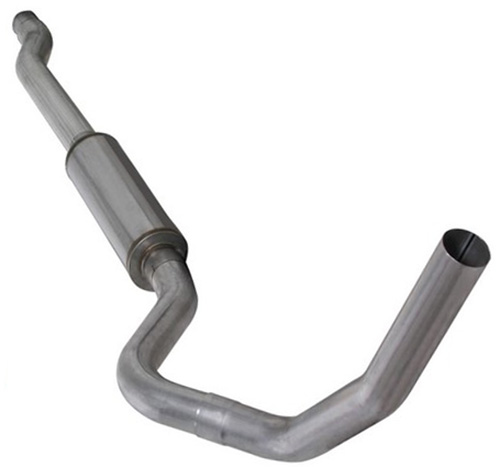
Ported High Flow Exhaust Manifolds for 2003-2010 Ford Powerstroke Diesel 6.0L 6.4L
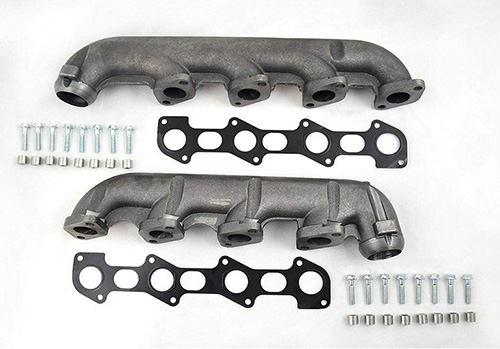
MBRP M1004S Universal Quiet Tone Muffler
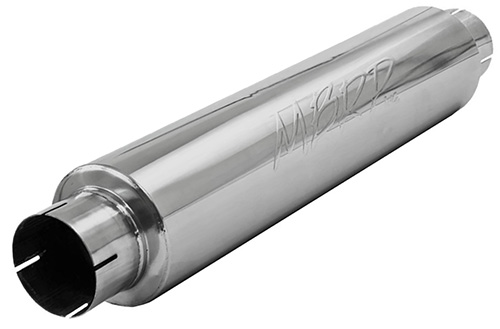
MBRP T5112BLK 10" Black Finish Angled Rolled End Exhaust Tip
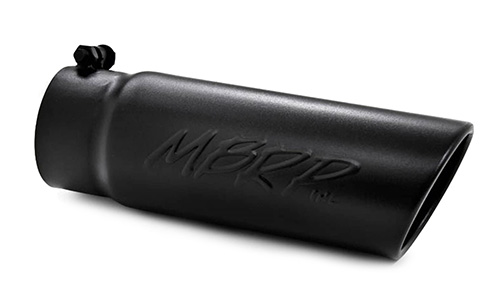
Types of Powerstroke Exhaust Systems
When installing exhaust systems for your truck, you can choose from many types.
Cat-Back
A Ford 6.0 powerstroke exhaust system replaces your truck’s catalytic converter back, which is the most common type of installation on Super Duty trucks. The diameter of some piping can be upgraded for better gas flow and an increase in horsepower.
Axle-Back
The Ford 6.0 powerstroke exhaust system consists of replacing only the mufflers and back-based equipment, just not the catalytic converter. This type is best for noise quality but more expensive than cat-back systems. It can also be easier to install in some cases.
Header Back
Ford 6.0 powerstroke exhaust systems are the most expensive type of exhaust system because they replace every component, but this allows you to replace all components at once and upgrade them for a better gas flow.
Single vs. Dual Exhaust Systems
Ford exhaust systems are designed to fit your needs. You have the option of purchasing a single or dual tip, depending on what kind of installation you need and want.
Single Exhaust System
Single exhaust systems are typically paired with a smaller engine, but most come with an additional tip to better simulate the dual system look. The best option for performance is a dual exhaust system. This may be easier to install, but it’s also more expensive than the single and quad systems.
Dual Exhaust System
A Ford 6.0 powerstroke exhaust system is more efficient at expelling gases because it’s a dual pipe system that expels the gas from both on one side of the vehicle. The dual pipes expel exhaust gas from the manifold of your vehicle and send it out the back through a hole in your car’s rear end. While these systems are better.
Bad 6.0 Powerstroke Exhaust System: Symptoms
One of the symptoms you might find when your exhaust system is failing is the noise level.
Excessive Noise
The exhaust system on a Ford 6.0 powerstroke truck includes several pipes, which can be prone to cracks and leaks that will cause noise issues.
Raw Fuel Smell
If your exhaust starts to fail you might start smelling raw diesel fuel in the cabin. This would be both annoying and dangerous for anybody inside of the vehicle.
Decrease in Performance
When you start to notice problems with the way your truck is running, you should check on whether or not there is an exhaust leak. This could potentially be at least one of the causes for performance issues like diminished acceleration and power loss. The problem might just stem from a variety of other problems in addition to an exhaust leak.
Physical Damage
Noticing exhaust tubes or pipes hanging down below your truck indicates that there’s a problem with the system.The exhaust pipe will extend below the truck, which often causes it to become visible in addition to creating a loud noise. It seems like something is wrong with the exhaust and needs to be replaced.
Should you tune your exhaust system?
A tuned exhaust system delivers the best performance from your car engine. To tune an exhaust system, you need to either buy a custom aftermarket exhaust pipe or whole of the system and install it in your car.
Back Pressure compensation
Vehicles typically experience reduced performance due to backpressure. This is a constraint of gas that sometimes comes from the manifold, and it can be solved through different manifolds available in various cars.The main differences between the aftermarket exhaust systems and factory ones is that, while both are designed to be efficient in airflow, factory models often have inefficient muffler designs or can clog up much more easily. These hindrances cause the 6.0 powerstroke engines to struggle at achieving optimum horsepower which warrants an upgrade.
Getting the right airflow
When an engine can’t be as powerful as it could because there isn’t enough air getting to the combustion chambers, we can improve gas mileage by installing Ford 6.0 powerstroke exhaust systems or other things that help get more air into the engine. An efficient exhaust system allows for increased airflow which helps the engine perform and can be pushed to its maximum level.
Stock exhaust systems can have a detrimental effect on performance, but aftermarket mufflers do not have the same issues.
Installing a New Exhaust for 6.0 Powerstroke
- Replacing a 6.0 Powerstroke exhaust is not easy work. You will need to have some mechanical experience and the right tools for the job. If you are mechanically inclined, you can do this installation yourself and save some of your hard-earned money too!
- Park your truck on a flat surface.
- Turn off the engine and remove the keys.
- Safely raise the truck and secure it on jack stands.
- Spray all hardware with a penetrating catalyst and let it soak for a few minutes.
- Remove the stock exhaust. This might require cutting some pipes in front of or behind the catalytic converter.
- Remove all hangers and replace them with new hangers.
- Install new gaskets.
- Put on the new exhaust system.
- Secure all clamps and hangers to hold the exhaust system in place.
- Check your work carefully.
- Lower your truck to the ground and take a test drive.
Taking Care of 6.0 Powerstroke Exhaust System
A new Ford 6.0 powerstroke exhaust system saves you from the wear and tear that everyday usage can do to the inside of your truck. In order to avoid a replacement, maintenance on current designs is needed in specific ways.
1. Listen to Check Engine Light
One of the first jobs you should tackle when your Check Engine Light starts flashing is checking the exhaust. Possible problems with the air/fuel mixture could damage the system, raising its temperature to extremes and stripping it out in a matter of days. Use an OBD II scanner to find out the trouble code. Once you know what is wrong, you can fix the problem.
2. Repair Broken Parts
The exhaust system is an intricate set of functions that depend on each other. A failure in any one place can have a negative impact on the rest of the system. The hangers of an exhaust pipe serve to hold up and support the piping, which if broken will cause all sorts of problems for your truck or car. To avoid overstressing and potential damage to other elements in the exhaust system such as mufflers, fixing broken parts should be addressed right away no matter how small of an issue may seem.
3. Fix Leaks
One way to easily check your exhaust system is to see if there are any leaks. Leaks can come from the manifold or the gasket, and you might notice a difference in performance of your engine. Leaks are common in Ford diesel engines, but they typically occur near the exhaust pipe junction. It can also be caused by corrosion or rust- either way, once you find the leak and fix it before other parts of your engine fail.
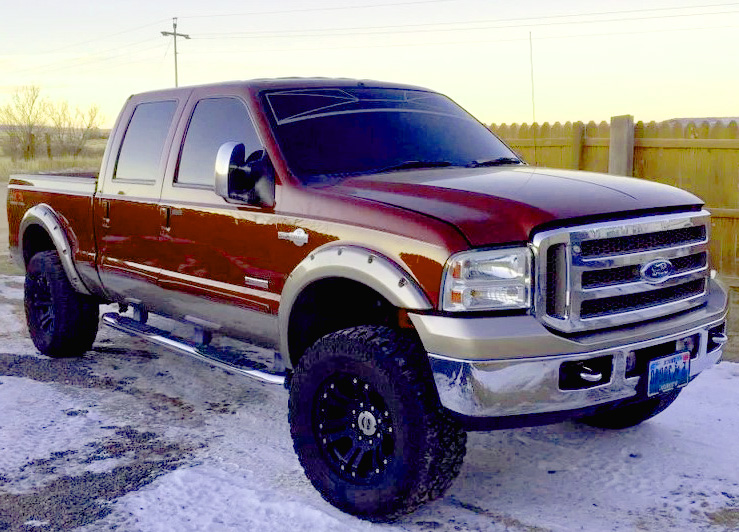
Ford 6.0 Powerstroke Exhaust Systems: FAQ
What is the 6.0 Powerstroke?
The 7.3L Powerstroke was Ford’s original diesel engine, but there were complaints about its efficiency so they built the 6.0L Powerstroke in 2003 models to try and comply. The next Navistar-built turbodiesel came created and is implemented on new truck models with a displacement of 365 cubic inches that produces 325 horsepower and 560 pound-feet torque for a bore of 3.74 inches and stroke of 4.13 inchesю
Who makes the best diesel exhaust system for Ford 6.0 Powerstroke engines?
With so many companies eager to build a high-quality exhaust system, it can be a challenge finding the best product for your 6.0 Powerstroke engine. We have highlighted four of our top choices and encourage you to find one that suits you best.
What is the cost to replace a 6.0 Powerstroke exhaust?
In general, you could spend $1,000 or more on an exhaust replacement for your pickup truck depending on what style system you choose and if it is professionally installed. Installing the kit yourself will save a significant amount of money.
Does a Ford 6.0 diesel exhaust system void my warranty?
It’s possible that your Ford truck has a factory warranty, but unlikely. If you purchase your 6.0 Powerstroke from a reputable dealer and they provided you with an extended warranty at time of purchase, then the exhaust isn’t going to void any type of warranty or cause the engine to fail.
What are some common 6.0 Powerstroke problems?
It is very unlikely that your 6.0 Powerstroke vehicle has any warranty coverage at this point, but if you purchased it second-hand from a reputable dealer and had some type of dealership warranty, the new exhaust should not break that warranty. Aftermarket parts – including an exhaust system – can’t void your factory or dealership warranty unless they cause damage in place of repairable under the policy.
What is the difference between an aluminum and stainless steel exhaust system?
Stainless steel and aluminum exhaust systems are more alike than they are different. Stainless steel is milder to look at, while stainless cans offer better protection against corrosion and rust.
Aluminized or Stainless Steel?
The most popular option in aftermarket exhaust systems is an aluminized steel or stainless steel system. Aluminizing is an inexpensive choice and has three layers of material: A steel core, then aluminum, and finally oxidized aluminum. The oxidization on the outside layer helps prevent corrosion in the steel on the inside of the tubes. Stainless steel is iron with at least 10.5% chromium, which makes it more expensive but worth the price because stainless has better strength and longevity than aluminum-clad steel. Most customers who are in salty or harsh environments will buy stainless instead of aluminum-clad, since it lasts longer and resists corrosion better. Some companies also offer lifetime warranties with their products that are made out of stainless steel.
Adding an exhaust tip to your system?
Stainless steel and powder-coated exhaust end tips are available in a range of sizes, shapes, and designs. The length of the tip will depend on how much room your exhaust system is working with. Most customers choose a 15 inch tube for its visibility, but 18 or 24 inches are options as well.
Exhaust tips offer no performance gains but are only for bragging rights and aesthetics.
Ford 6.0 Powerstroke Exhaust Systems: Conclusion
You can find the best Ford 6.0 powerstroke exhaust system by performing a little research, which also improves efficiency and increases your engine’s aggressive tone.
You will be able to see the difference between aftermarket mufflers and stock ones when it comes to sound isolation. Aftermarket mufflers do not have a sound isolating section; instead, they let air flow through freely. If your country doesn’t have a regulation on the sound and exhaust system, you can tune your motorcycle to get it sounding the best.
Most people don’t know the importance of swapping out their vehicle’s exhaust system with one that has quality third party parts. In terms of car modifications, this is the least expensive but you’ll get superior performance from it. Installing a 6.0 Powerstroke exhaust increases performance and decreases system wear by giving it the proper flow of gases
We have a list of exhaust systems and sensors for the 6.0 powerstroke engine, that will help you get your vehicle back up to speed without too much strain on your main engine. You should try them out and then head to the nearest service center for more in-depth performance testing.

